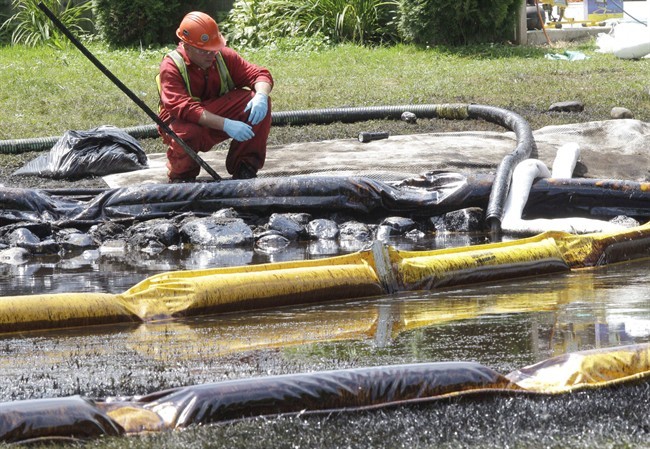MARSHALL, Mich. – Enbridge Inc. has reached a settlement with the state of Michigan nearly five years after a broken pipeline spilled more than three million litres of oil into wetlands and the Kalamazoo River.

State officials say the Calgary-based company has agreed to restore or create 120 hectares of wetlands valued at $30 million as part of the agreement to improve the watershed in southwestern Michigan.
The settlement also requires Enbridge to continue to monitor the impacts of the spill on the environment and pay $12 million to reimburse the state for legal costs and the expense of overseeing cleanup and restoration.
The company has also agreed to spend $75 million, much of it on various projects, including a dam removal and improved access to boating and fishing on the river. Some projects have been finished.
The improvements are on top of Enbridge’s costs directly related to the spill, which have been pegged at more than $1 billion.
The pipeline rupture in July 2010 spoiled approximately 64 kilometres of the Kalamazoo River and Talmadge Creek. The line runs through Michigan and carries oil between Ontario and Griffith, Indiana.

Get daily National news
Wetlands are considered to be crucial in a watershed, serving as nature’s filter in absorbing and releasing water and providing habitat to fish and wildlife.
“That’s huge,” said Nicole Zacharda, an enforcement specialist at the Department of Environmental Quality. “They have to be within the Kalamazoo River watershed so that we keep the benefits in the same area where the injuries occurred.”
- After controversial directive, Quebec now says anglophones have right to English health services
- Home reno spending was up $300B over pandemic, Re/Max Canada says
- Cineplex slapped with record $38.9M fine over online booking fee
- Michael Kovrig reflects on ‘brutally hard’ Chinese detention: ‘You’re totally alone’
“Everyone has this image of a river coated with oil. We’ve come a long way,” said Mark DuCharme of DEQ’s remediation division as he guided reporters on the river last week.
Indeed, there was no sign of oil on the surface during the two-hour paddle. Feisty smallmouth bass broke the surface. A blue heron glided shore to shore under the sun, and turtles warmed themselves on fallen trees.
“You’re not seeing it, but we do know there’s oil left in the system,” DuCharme said. “It’s left in the banks at some spots. It’s left in the bottom of the river. But it’s a little bit of oil. It truly is residual. … You’re not going to see a lot of heavy equipment out here anymore.”
He stopped his kayak at a wetland and shoved his paddle into the ground. A narrow sheen hit the surface, indicating a pocket of oil. DuCharme said there are no plans to excavate the site because digging up the wetland would do more harm than good. There are other similar examples in the watershed.
“That’s what we’re talking about when we’re talking about residual oil,” he said.
“We realize some groups will jump on this settlement and say it looks small – like more money means more justice,” DEQ spokesman Brad Wurfel said. “This settlement is huge, because while a few million more to the state’s General Fund wouldn’t do a thing to help improve the river, this settlement specifically focuses (on) creating a healthier, more accessible waterway.”







Comments